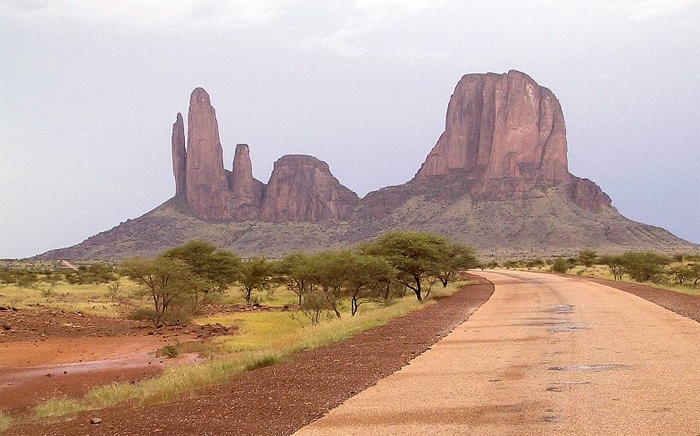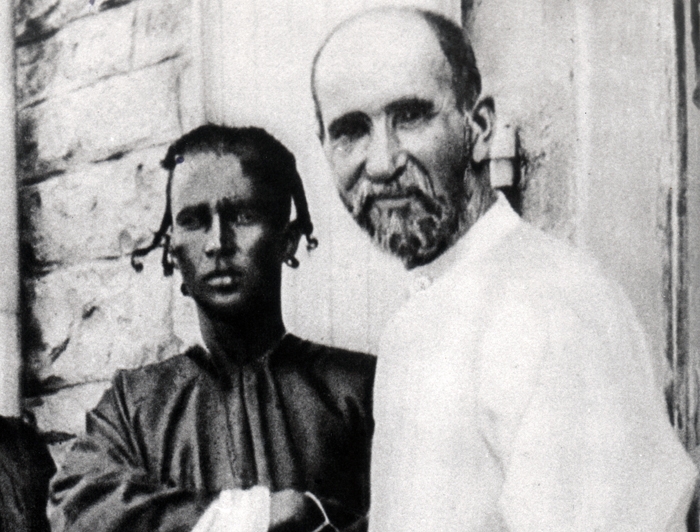Here You Have Watches, There We Have Time

During his years spent in the Sahara Desert, Charles de Foucuald (1858-1916) was a solitary European and Christian presence among the indigenous Tuaregs of the region. Wanting to know them better, Charles learned their stories and poetry and worked on a French-Tuareg dictionary. He drew detailed pictures of everyday Tuareg life, from musical instruments to hair braids. He wanted to know the soul of the people. He wanted to be their brother.
Rene Voillaume, founder of the Little Brothers of Jesus, said that Charles joined “his total dedication to the welfare of the Tuaregs [with] an attentive, realistic charity and a very strong sense of justice.” Loving the Tuaregs was Charles’ school for loving God.

The Tuaregs, these nomadic tribes with their distinctive blue robes, remain a mystery to many people today. Below is an interview with a modern-day Tuareg living in France. Moussa Ag Assarid was born in northern Mali around 1975. The desire for additional education led him to France in 1999. He has worked as a journalist, actor, tour guide, and writer. Moussa wrote an autobiographical account of his journeys in a book, There are No Traffic Jams in the Desert: Chronicles of a Tuareg in France.
Moussa was interviewed in 2011 by Victor M. Amelain for ARIEL Magazine (the link to the original article is below). This candid conversation gives insight into the world-view of a people who were important in the life of Charles, the spiritual father of the Joseph House and the Little Sisters.
An interview with Moussa Ag Assarid:
I don’t know my age. I was born in the Sahara desert, with no papers! I was born in a nomadic camp of Tuaregs, between Timbuktu and Gao, in the north of Mali. I have been a shepherd of camels, goats, sheep and cows for my father. Today I study Management in the University of Montpellier. I am a bachelor. I serve as an advocate for the Tuareg shepherds.
What a beautiful headdress!
It is a fine cotton fabric: it allows me to cover my face in the desert when the wind blows sand, and allows me to continue to see and to breathe through it.
It is a beautiful blue color.
We Tuaregs have long been called “the blue men” because of this color. Interestingly the fabric loses the color and transfers some of the blue ink onto our skin.
How do you get this intense blue?
From a plant called indigo, mixed with other natural pigments. The blue, for the Tuaregs, is the color of the world.
Why?
It’s the dominant color, of the sky, the roof of our home

Who are the Tuareg?
Tuareg means ‘abandoned’, because we are an old nomadic tribe of the desert. We are lonely and proud: masters of the desert, they call us. Our ethnic group is Amazigh (or Berber), and our alphabet is the Tifinagh.
How many are there of you?
Approximately three million, the majority still are nomadic. But the population is decreasing. A wise man said it is necessary for a tribe to disappear to realize they existed. I am working to preserve this tribe.
What do they do for a living?
We shepherd camels, goats, sheep, cows and donkeys in an infinite kingdom of silence.
Is the desert really so silent?
If you are on your own in that silence you hear your heart beat. There is no better place to meet yourself.
What memories do you have of your childhood in the desert?
I wake up with the sun. The goats of my father are there. They give us milk and meat, and we take them were there is water and grass. My great-grandfather did it, and my grandfather, and my father, and me. There was nothing else in the world than that, and I was very happy!
Really? It doesn’t sound very exciting.
It is. At the age of seven you can go alone away from the compound, and for this you are taught the important things—to smell the air, to listen, to see, to orient with the sun and the stars…and to be guided by the camel if you get lost. He will take you where there is water.
This sounds like valuable knowledge, no doubt.
Everything is simple and profound there. There are very few things, and each one has enormous value.
So that world and this one are very different.
There, every little thing gives happiness. Every touch is valuable. We feel great joy just by touching each other, being together. There, nobody dreams of becoming, because everybody already is.
What shocked you most on your first trip to Europe?
I saw people running in the airport. In the desert you only run if a sandstorm is approaching! It scared me, of course.
They were going after their baggage.
Yes, that was it. I also saw signs with naked women. Why this lack of respect for the woman? I wondered. Then at the hotel I saw the first faucet of my life: I saw the water run and wanted to cry.
Because of the waste, the abundance?
Every day of my life had been involved in seeking water. When I see the ornamental fountains here and there, I still feel an intense pain.
Why?
In the early 90s there was a big drought, animals died, and we became sick. I was about twelve years old and my mother died. She was everything to me! She used to tell me stories and taught me to tell stories. She taught me to be myself.
What happened to your family?
I persuaded my father to let me go to school. Every day I walked fifteen kilometers, until one teacher gave me a bed to sleep in and a woman gave me food when I walked by her house. I then understood what was happening; my mother was helping me.
Where did you get interested in school?
A few years before the Paris-Dakar motor rally came through the compound and a journalist dropped a book from her backpack. I picked it up and gave it to her. She gave it to me and talked to me about that book: “The Little Prince.” I promised myself that I would be able to read it one day.
And you did.
Yes, and because of that I won a scholarship to study in France.
A Tuareg going to college!
Ah, what I most miss here is the camel milk. And the wood fires. And walking barefoot on the warm sand. And the stars. We watched them every night, every star is different, just as every goat is different. Here, in the evenings, you watch TV.
That is true. What do you dislike the most here?
You have everything, and it is still not enough for you. You complain. In France people complain all the time! You chain yourself to a bank; everyone is anxious to have things, to have possessions. Everyone is in a rush. In the desert there are no traffic jams, and do you know why? Because there nobody is interested in getting ahead of other people.

Tell me about a moment of deep happiness for you in the desert.
It happens every day, two hours before sunset. The heat decreases, there is still no cold air, and men and animals slowly return to the compound, and their profiles are painted against a sky that is pink, blue, red, yellow, green.
That sounds fascinating.
It’s a magical moment. We all get into the tents and we boil tea. Sitting in silence we listen to the sound of the boiling water. We are immersed in calmness, with our the heart beating to the rhythm of the boiling water, potta potta potta . . .
How peaceful.
Yes . . . here you have watches; there, we have time.
Original Interview:
http://www.revista-ariel.org/index.php?option=com_content&view=article&id=1017%3Aan-interview-with-moussa-ag-assarid&catid=58%3Ahuman-development&Itemid=83
Photo Credits:
LANDSCAPE
https://commons.wikimedia.org/wiki/File%3AHand_der_Fatima.jpg
By Timm Guenther (Timm Busshaus) (Own work) [GFDL (http://www.gnu.org/copyleft/fdl.html), CC-BY-SA-3.0 (http://creativecommons.org/licenses/by-sa/3.0/) or CC BY-SA 2.5-2.0-1.0 (http://creativecommons.org/licenses/by-sa/2.5-2.0-1.0)], via Wikimedia Commons
BR. CHARLES AND OUKSEM AG CHIKKAT
Archives of the Little Sisters of Jesus and Mary
BOOK
http://www.amazon.com/Y-pas-dembouteillage-dans-desert/dp/2298007004/ref=sr_1_1?s=books&ie=UTF8&qid=1452268957&sr=1-1&keywords=2298007004
TUAREG MEN
https://commons.wikimedia.org/wiki/File%3AMali1974-151_hg.jpg
By H. Grobe (Own work) [CC BY-SA 3.0 (http://creativecommons.org/licenses/by-sa/3.0)], via Wikimedia Commons
